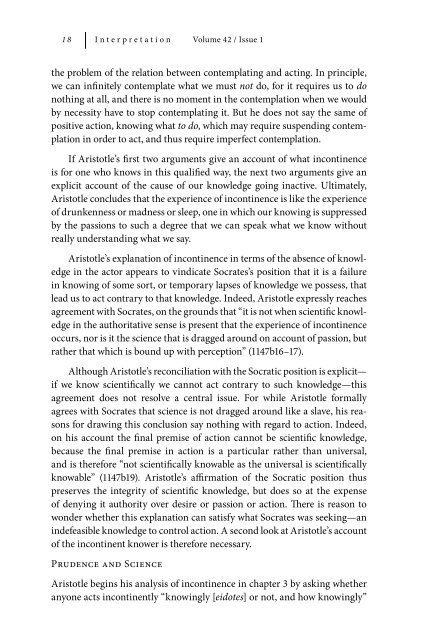Fall 2015
Vol_42_1
Vol_42_1
- No tags were found...
Create successful ePaper yourself
Turn your PDF publications into a flip-book with our unique Google optimized e-Paper software.
1 8 I n t e r p r e t a t i o n Volume 42 / Issue 1<br />
the problem of the relation between contemplating and acting. In principle,<br />
we can infinitely contemplate what we must not do, for it requires us to do<br />
nothing at all, and there is no moment in the contemplation when we would<br />
by necessity have to stop contemplating it. But he does not say the same of<br />
positive action, knowing what to do, which may require suspending contemplation<br />
in order to act, and thus require imperfect contemplation.<br />
If Aristotle’s first two arguments give an account of what incontinence<br />
is for one who knows in this qualified way, the next two arguments give an<br />
explicit account of the cause of our knowledge going inactive. Ultimately,<br />
Aristotle concludes that the experience of incontinence is like the experience<br />
of drunkenness or madness or sleep, one in which our knowing is suppressed<br />
by the passions to such a degree that we can speak what we know without<br />
really understanding what we say.<br />
Aristotle’s explanation of incontinence in terms of the absence of knowledge<br />
in the actor appears to vindicate Socrates’s position that it is a failure<br />
in knowing of some sort, or temporary lapses of knowledge we possess, that<br />
lead us to act contrary to that knowledge. Indeed, Aristotle expressly reaches<br />
agreement with Socrates, on the grounds that “it is not when scientific knowledge<br />
in the authoritative sense is present that the experience of incontinence<br />
occurs, nor is it the science that is dragged around on account of passion, but<br />
rather that which is bound up with perception” (1147b16–17).<br />
Although Aristotle’s reconciliation with the Socratic position is explicit—<br />
if we know scientifically we cannot act contrary to such knowledge—this<br />
agreement does not resolve a central issue. For while Aristotle formally<br />
agrees with Socrates that science is not dragged around like a slave, his reasons<br />
for drawing this conclusion say nothing with regard to action. Indeed,<br />
on his account the final premise of action cannot be scientific knowledge,<br />
because the final premise in action is a particular rather than universal,<br />
and is therefore “not scientifically knowable as the universal is scientifically<br />
knowable” (1147b19). Aristotle’s affirmation of the Socratic position thus<br />
preserves the integrity of scientific knowledge, but does so at the expense<br />
of denying it authority over desire or passion or action. There is reason to<br />
wonder whether this explanation can satisfy what Socrates was seeking—an<br />
indefeasible knowledge to control action. A second look at Aristotle’s account<br />
of the incontinent knower is therefore necessary.<br />
Prudence and Science<br />
Aristotle begins his analysis of incontinence in chapter 3 by asking whether<br />
anyone acts incontinently “knowingly [eidotes] or not, and how knowingly”


